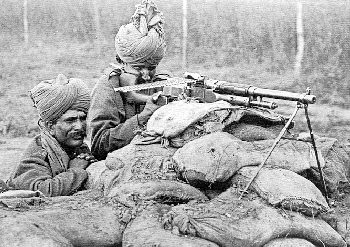India and World War One
India played an invaluable role in World War One, fighting for the Allies in every major theatre of operations. Despite India’s vital contribution, her importance is often overlooked by those who assume that only Europeans were involved in the conflict on the Western Front.
At the start of war in 1914 the political situation in India was unstable. The Indian National Congress had grown in strength and it was campaigning for greater self-government. The Germans had tried to stir up anti-British feeling in India before the war. Some Indians thought that Indian separatists would take advantage of a British crisis to advance their cause.
However, the outbreak of war on 4 August was greeted with support for the British cause. Those who strove for Indian independence believed the best chance of achieving it was by helping out Britain. Offers of financial and military help came flooding in. Rich princes offered great sums of money, and even areas outside of British India offered help – Nepal offered help and in total sent 100,000 Gurkhas, whilst the Dalai Lama in Tibet offered 1,000 of his troops to the cause. In fact, during this time unrest subsided and Britain was able to take many troops and military equipment out of India.

By the end of 1914, Indian troops were thrown into the heat of battle on the Western Front. However, they had sustained many casualties by the end of 2015 and the British decided to withdraw the Indian Corps from the frontline.
All in all, 800,000 Indian troops fought in World War One and 1.5 million had volunteered to fight. In total, 47,746 were classed as killed or missing with 65,000 wounded. Their contribution was recognised through the 13,000 medals they won, including one Victoria Cross.
India hoped that its contribution to the war would also be rewarded through greater self-government, but Britain was unwilling to offer this. This disappointing realisation led to a more militant mood in India. During the last phases of the war Mahatma Gandhi articulated these frustrations: “Seek ye first the recruiting office, and everything will be added unto you.”
The British government’s failure to act served as a stimulus for Gandhi and the independence movement intensified.
After the war an effort was made to expand participation of Indians in the government of India. In 1919, the British introduced the Government of India Act. It gave a small percentage of the country’s richest citizens the right to vote. It also organised for a commission to be held in 1929, to decide whether India could have more reforms.
India’s role in World War One should not be underestimated. But, the war also had a significant impact on India’s politics and independence movement. Although it would be almost 30 years and another World War until they were given the freedom they wanted.
See also: South Africa and World War One
MLA Citation/Reference
"India and World War One". HistoryLearning.com. 2026. Web.
